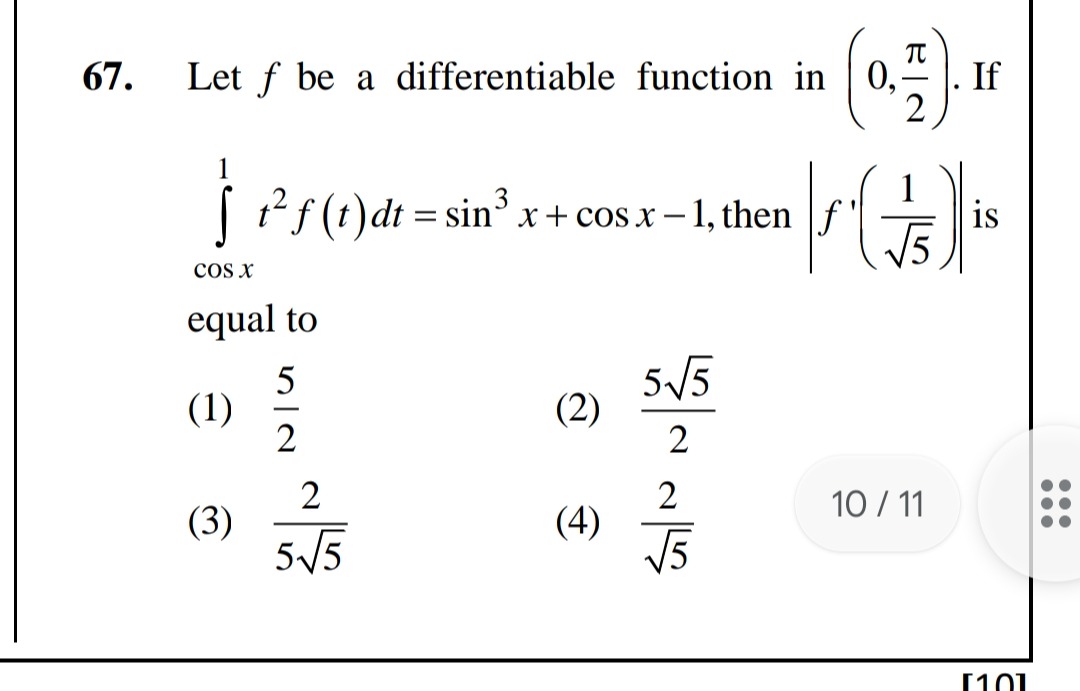Question
Question: Let $f$ be a differentiable function in $\left(0,\frac{\pi}{2}\right)$. If $\int_{\cos x}^{1} t^2 f(...
Let f be a differentiable function in (0,2π). If ∫cosx1t2f(t)dt=sin3x+cosx−1, then f′(51) is equal to

25
255
552
52
255
Solution
The problem requires us to find the absolute value of the derivative of a function f at a specific point, given an integral equation involving f(t).
1. Differentiate the given integral equation using Leibniz's Rule.
The given equation is ∫cosx1t2f(t)dt=sin3x+cosx−1.
Let G(x)=∫cosx1t2f(t)dt. According to Leibniz's Rule, if G(x)=∫a(x)b(x)h(t)dt, then G′(x)=h(b(x))b′(x)−h(a(x))a′(x).
Here, h(t)=t2f(t), a(x)=cosx, and b(x)=1. So, a′(x)=−sinx and b′(x)=0.
Differentiating the left side:
dxd(∫cosx1t2f(t)dt)=(1)2f(1)⋅(0)−(cosx)2f(cosx)⋅(−sinx) =0−(−sinxcos2xf(cosx))=sinxcos2xf(cosx)Differentiating the right side:
dxd(sin3x+cosx−1)=3sin2xcosx−sinxEquating the derivatives:
sinxcos2xf(cosx)=3sin2xcosx−sinx2. Solve for f(cosx) and then find f(t).
Since x∈(0,2π), sinx=0. We can divide both sides by sinx:
cos2xf(cosx)=3sinxcosx−1 f(cosx)=cos2x3sinxcosx−1Let t=cosx. Since x∈(0,2π), t∈(0,1). Also, for x∈(0,2π), sinx=1−cos2x=1−t2. Substitute t and 1−t2 into the expression for f(cosx):
f(t)=t23t1−t2−1This can be rewritten as:
f(t)=t23t1−t2−t21=3t1−t2−t213. Differentiate f(t) to find f′(t).
We differentiate f(t) term by term: For the first term, 3t1−t2: Using the quotient rule (vu)′=v2u′v−uv′, where u=1−t2 and v=t. u′=21−t21(−2t)=1−t2−t and v′=1.
dtd(t1−t2)=t2(1−t2−t)⋅t−1−t2⋅1 =t21−t2−t2−1−t21−t2=t21−t2−t2−(1−t2)=t21−t2−1So, the derivative of the first term is 3(t21−t2−1)=−t21−t23.
For the second term, −t21=−t−2:
dtd(−t−2)=−(−2)t−3=t32Combining these, we get f′(t):
f′(t)=−t21−t23+t324. Substitute t=51 into f′(t) and calculate the result.
We need to evaluate f′(51). First, calculate the necessary values for t=51: t2=(51)2=51. t3=(51)3=551. 1−t2=1−51=54=52.
Now substitute these values into f′(t):
f′(51)=−(51)(52)3+(551)2 =−5523+2⋅55 =−3⋅255+105 =−2155+2205 =2555. Find the absolute value.
The question asks for f′(51).
f′(51)=255=255The final answer is 255.
